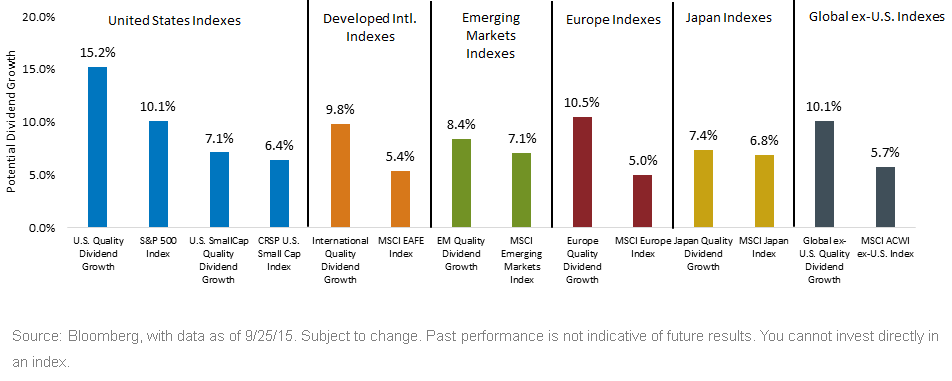Quality Stocks in Focus Amid Global Volatility


 For definitions of indexes in the chart, visit our glossary.
• U.S. Large Caps Strongest Overall: The S&P 500 Index has the strongest return on equity of any market capitalization-weighted Index that we show by a significant margin. It is therefore impressive that U.S. Quality Dividend Growth gets approximately 50% higher.
• Europe Had Highest Relative Difference: The application of WisdomTree’s Quality Dividend Growth methodology had the largest relative impact in Europe, where the potential dividend growth was double that of the MSCI Europe Index.
• International Differentials: While Europe has the widest differentials, both the developed international and global ex-U.S. saw differentials of similar magnitude, as the market cap-weighted benchmarks saw potential dividend growth in the 5% to 6% range, and the WisdomTree International Quality Dividend Growth and Global ex-U.S. Quality Dividend Growth had a range of 9.8% to 10.1%, also notable differentials.
Conclusion
While the future is of course uncertain, we believe that our dividend growth methodology applies a framework to selecting dividend payers with growth characteristics. We have focused on variables that we believe are key drivers of dividend growth, and this is a theme that could apply to all equities worldwide. With the global market uncertainty, we think quality stocks should receive greater attention from investors.
1Source: Standard & Poor’s, as of 9/25/2015.
2Source: Warren E. Buffett, Berkshire Hathaway annual letter to shareholders, 2/28/15.
For definitions of indexes in the chart, visit our glossary.
• U.S. Large Caps Strongest Overall: The S&P 500 Index has the strongest return on equity of any market capitalization-weighted Index that we show by a significant margin. It is therefore impressive that U.S. Quality Dividend Growth gets approximately 50% higher.
• Europe Had Highest Relative Difference: The application of WisdomTree’s Quality Dividend Growth methodology had the largest relative impact in Europe, where the potential dividend growth was double that of the MSCI Europe Index.
• International Differentials: While Europe has the widest differentials, both the developed international and global ex-U.S. saw differentials of similar magnitude, as the market cap-weighted benchmarks saw potential dividend growth in the 5% to 6% range, and the WisdomTree International Quality Dividend Growth and Global ex-U.S. Quality Dividend Growth had a range of 9.8% to 10.1%, also notable differentials.
Conclusion
While the future is of course uncertain, we believe that our dividend growth methodology applies a framework to selecting dividend payers with growth characteristics. We have focused on variables that we believe are key drivers of dividend growth, and this is a theme that could apply to all equities worldwide. With the global market uncertainty, we think quality stocks should receive greater attention from investors.
1Source: Standard & Poor’s, as of 9/25/2015.
2Source: Warren E. Buffett, Berkshire Hathaway annual letter to shareholders, 2/28/15.
Important Risks Related to this Article
Dividends are not guaranteed, and a company’s future ability to pay dividends may be limited. A company currently paying dividends may cease paying dividends at any time.

Christopher Gannatti began at WisdomTree as a Research Analyst in December 2010, working directly with Jeremy Schwartz, CFA®, Director of Research. In January of 2014, he was promoted to Associate Director of Research where he was responsible to lead different groups of analysts and strategists within the broader Research team at WisdomTree. In February of 2018, Christopher was promoted to Head of Research, Europe, where he was based out of WisdomTree’s London office and was responsible for the full WisdomTree research effort within the European market, as well as supporting the UCITs platform globally. In November 2021, Christopher was promoted to Global Head of Research, now responsible for numerous communications on investment strategy globally, particularly in the thematic equity space. Christopher came to WisdomTree from Lord Abbett, where he worked for four and a half years as a Regional Consultant. He received his MBA in Quantitative Finance, Accounting, and Economics from NYU’s Stern School of Business in 2010, and he received his bachelor’s degree from Colgate University in Economics in 2006. Christopher is a holder of the Chartered Financial Analyst Designation.

